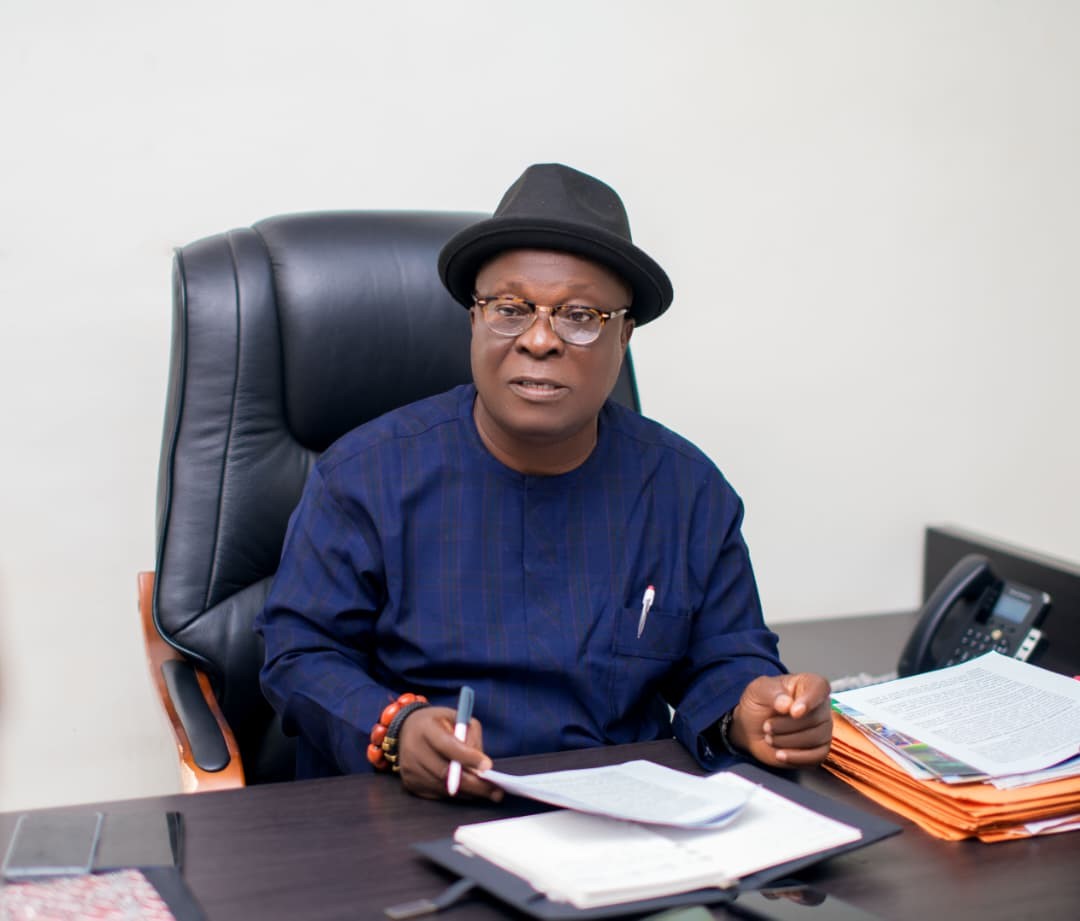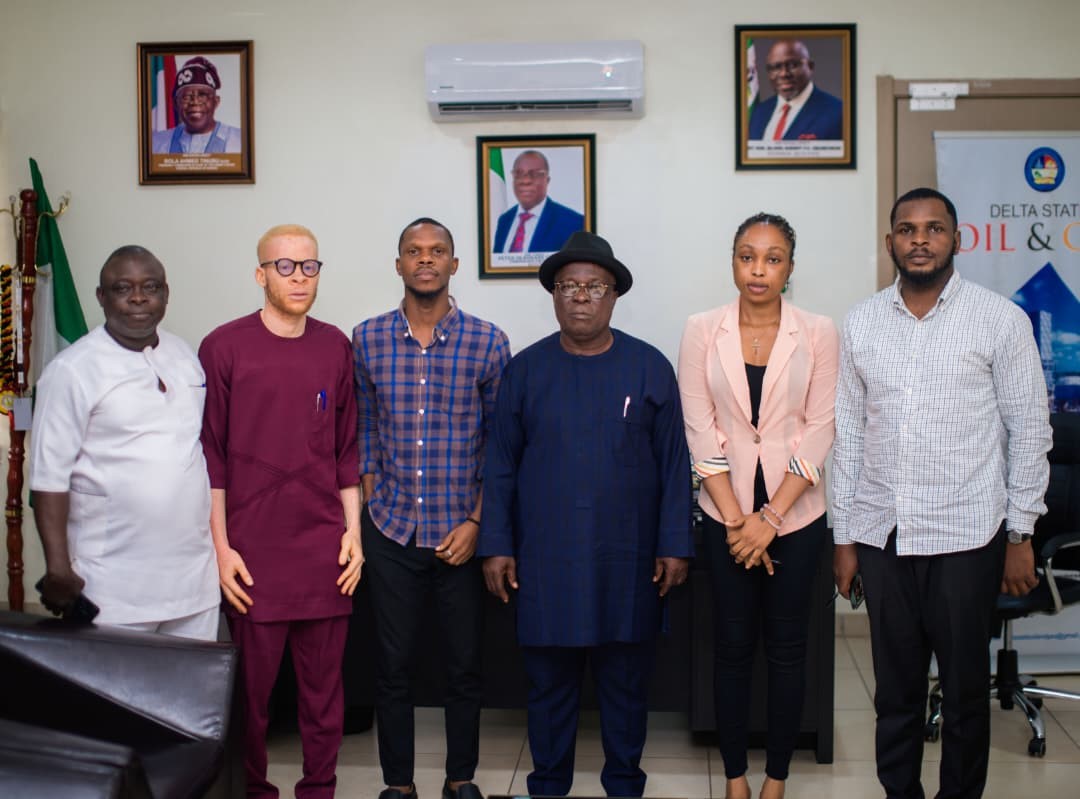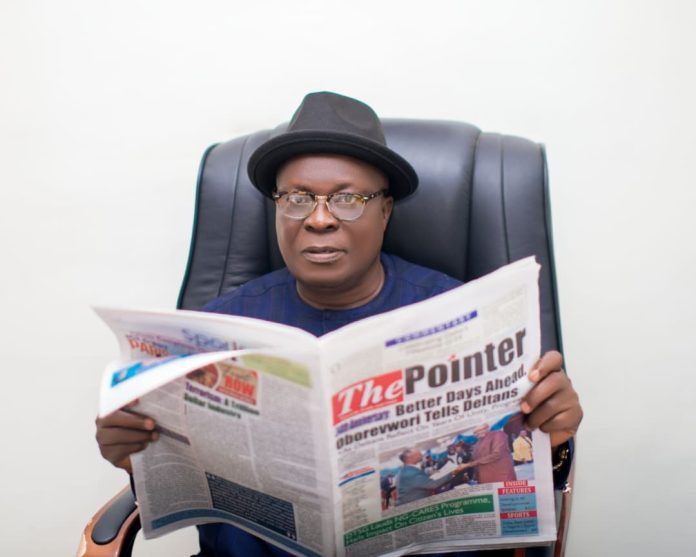Our Personality on The Pointer Platform this week is the Delta State Commissioner for Oil and Gas, Honourable Chief Peter Uviejitobor. He represented Udu State constituency in the State House of Assembly for eight years, thus making him a two-time member of the House of Assembly. He was also at one-time Special Adviser to the State governor. In this discuss, he spoke on the strategic roles the Ministry of Oil and Gas is playing in resolving host communities conflict with oil companies in the State, the challenges and successes recorded, capping with the strategies adopted by the ministry, lead to Delta State winning the award of the most peaceful State for Oil and Gas investments on Nigeria. Excerpts.

Could you please tell us what your duties are as commissioner for Oil and Gas, and what is the scope of coverage of your ministry?
The position as Commissioner for Oil and Gas carries a lot of responsibilities.
We are saddled with many duties. Primarily, the core responsibility of the Ministry of Oil and Gas is conflict management. We mediate between stakeholders, what we call “settlors”, meaning the oil companies, and the host communities.
We also mediate between companies or other parties dealing with oil companies. In essence, we mediate between the settlors, the host communities, and all stakeholders involved in oil and gas activities.
As you mentioned, the Ministry serves as a mediator between oil companies (the settlors) and the host communities. What mechanisms does the Ministry have in place for settling disputes between the two parties?
Conflict management requires a particular approach. Our method in this Ministry is not confrontational. The state cannot operate in a vacuum. Whenever there is a crisis between any of the stakeholders, particularly the oil companies and the host communities, the state becomes the dominant paradigm, and one party is often at a disadvantage.
In such situations, the aggrieved party, whether the host community or the oil company, petitions the Ministry. That is where we step in.
To the ordinary person downstream, it might seem as though, once there is a crisis, the Ministry should simply barge in and intervene. No, doing so without recognition and due process can create bigger problems for both the Ministry and the state. So, we handle matters in such a way that the state, through our Ministry, is recognised as the legitimate mediator.
For instance, recently, we held about four meetings concerning disputes with Seplat Company.The issues a stake were critical. About a month ago, there was a crisis in Agge, Delta, close to Bayelsa State. The situation escalated to the point that naval officers, the DSS, and the Army all reached out to me, as the crisis was almost getting out of hand.
We intervened, and the matter has been put to rest.
Has there been petitions from host communities, oil companies or other stakeholders, and how many cases have been resolved since the inception of the Gov Sheriff Oborevwori administration?
Yes, we’ve handled many petitions, and more are still being submitted.
My Ministry is saddled with several obligations. As a Ministry, we act on behalf of the state government in conflict resolution between stakeholders in the oil and gas sector. The aim is to ensure a peaceful coexistence between host communities and oil operating companies.
Since the inception of the Oborevwori administration, the Delta State Government has remained focused on the MORE Agenda, ensuring that the dividends of democracy gets to Deltans. What achievements have your Ministry recorded so far in this regard.?
I was appointed Commissioner for Oil and Gas in August 2024 and resumed duty on August 7th. Upon assumption of duty, I embarked on a working tour of all departments of the Ministry to familiarise myself with their operations. Thereafter, I convened a general meeting of all staff for interactive sessions and needs assessments regarding office conditions, workplace relationships, and overall functionality.
This was to align the operations of the Ministry with the MORE Agenda of His Excellency, Rt. Hon. Elder Sheriff Oborevwori.
My first official assignment was to represent the governor in Abuja, where I delivered a speech on his behalf at the 3rd PENGASSAN Energy and Labour Summit (August 21st–23rd, 2024).
As a follow-up to that, I paid courtesy visits to all security agencies in the state to seek their partnership in protecting oil and gas facilities from vandalism and oil theft.
With these measures in place, I inaugurated a Task Force to monitor Oil and Gas facilities, in synergy with security agencies. The purpose of this was to boost oil production and revenue generation.
In line with the Petroleum Industry Act (PIA) 2021, I facilitated the signing of a Global Memorandum of Understanding (GMoU) between Blue Star Gas Company and 27 host communities in Delta State and two in Bayelsa State.
This was crucial in maintaining peace and security as the company sources gas across state boundaries for refining at the Total Gas Plant.
I also engaged consultants in the area of Oil and Gas operation, aimed at generating improved revenue to the state that would be devoid of possible diversion.
The Ministry has also been promoting oil and gas investment in Delta State, ensuring companies live up to their Corporate Social Responsibilities (CSR) under the Local Content Law. For instance, we hosted the 8th National Council on Hydrocarbons here in Asaba, in collaboration with the Delta State Investment and Development Agency.
At the meeting, our Ministry successfully pushed for the inclusion of state oil and gas ministries in Joint Investigation Visits (JIVs) whenever oil spills or related incidents occur.
Shall we look at some disputes your Ministry has handled, and probably resolved?
Yes, we have handled many. The Ministry intervened in the dispute between SEEPCO and Okpai (the Host Community), and a peaceful resolution was reached through the instrumentality of the PIA, while other SEEPCO cases and communities are ongoing. In the dispute between Umughini Pipeline Company and two (2) families from Ewu Community, we were able to resolve it.
Also the dispute between Oboro Urban Community and three families – the Egbori family. Etoin family and Okodi family was resolved by the ministry. In addition to this, the alleged case of extortion, banishment, and imprisonment between the Etoin family and the Okodi family was ressolved. The sharing pattern that brought the dispute was settled peacefully.
It is also on good record that the Ministry averted the crises that would have erupted between Heritage Energy Ltd. and the Emeragha Community that could have taken lives and destroyed properties. The Ministry proactively intervened and restored peace to the community, which allowed the company to carry out its routine operations unhindered.
There was also the dispute between the Umukwata Kingdom, Obi-Oluku quarter, and Platform Petroleum Ltd. The Ministry was able to intervene and resolved the crisis peacefully. Also between Irri Community in Isoko South Local Government Area and Oando Plc, the Ministry brokered peace between the company and the community over a case of the Company Liaison Officer (CLO), who was reported to have disrespected the Irri Monarch by staging a walkout from the King. The Ministry was able to restore peace between the company and the community, though the matter is still awaiting final conclusion.
I also recall the case an Oil Family and Heritage Ltd. The Ministry has held several peace initiative meetings over the Rent and Lease dispute. The Ministry has assured that there would be peace, and the matter had been settled amicably.
In the Seplat Company, Obotie and Ugbekoko Communities dispute, the Ministry directed all the parties involved to maintain the peace, pending the conclusion of the matter. Also, between Heritage and Willy Legal (Olomoro Community), the Ministry intervened and the F.T.O dispute between Olomoro Community and Heritage Energy was resolved and normalcy has been restored, though settlement of the matter is still ongoing. Other Heritage cases with other Host Communities are still pending for final discussion.
In Okwefen-Oghareki Community and Okwuemeva Oghare Community in Oghara Kingdom, the Ministry was able to resolve the long-standing locked-up Oil Well dispute between the two Communities. The matter was resolved, and the sharing arrangement of entitlement stands as follows: The Ogharefe Community is entitled to 40 per cent, while the Oghareki Community is entitled to 40 per cent as well. The Land owner(s) would have be 20 per cent.
The resolution of the Ministry further stated that the benefits accrued to the Land owner(s) would be deposited in an escrow Account until the issue of ownership of the land is resolved.
I also want to put it on record that the Ministry of Oil and Gas has restored peace between Energia Ltd. and the Host Communities of the Ugbo 1 field in the Warri North Local Government Area. It was a case of recurring community-induced shutdown of the Oil Well in OML 40, due to the denial of the Host Communities’ benefits of the Local Contents right by the Company.
The Ministry was able to achieve success in increasing oil production as a result of these peace and security initiatives. This led to the State being given an award for safety and the most peaceful State for Oil and Gas investments in Nigeria in 2024.
We were able to achieve all these in line with the MORE Agenda of Governor Sheriff Oborevwori.
The ministry is committed to ensuring that the state remains on top when it comes to oil production in Nigeria.
Oil spills have been a recurring issue in oil-producing states. What role dies your Ministry play in handling such?
Oil spills fall under the Joint Investigation Visit (JIV) mechanism. Currently, the Ministry of Environment, the Ministry of Justice, and one other ministry are included, but unfortunately, the Ministry of Oil and Gas is not. We have raised this concern at the federal level, insisting that all state Oil and Gas Ministries should be included in JIVs.
After JIV reports are concluded, if crimes or disputes arise, our Ministry steps in to mediate and restore peace. In cases of oil spills in host communities, the Ministry conducts on-the-spot assessments and inspections. The company responsible for the spill is then mandated to compensate the affected community and carry out proper clean-up exercises.
Recently, there was national discourse about encouraging the use of Compressed Natural Gas (CNG). What role is your Ministry playing in this regard?
Yes, CNG stands for Compressed Natural Gas. The federal and state governments are encouraging its adoption to reduce dependence on petrol, diesel (AGO), and kerosene (DPK), all of which consume crude oil. Rather than flaring gas, we are converting it into CNG for local consumption. This initiative started at the national level about one or two years ago, and it is now being adopted by states, including Delta. I am confident that Delta State will soon make a mark in CNG use.
On the issue of CSR. How is the Ministry ensuring that oil companies live up to their Corporate Social Responsibilities?
That falls directly under the local content provisions of the PIA. The challenge, however, is that we lack enabling state legislation to fully enforce CSR obligations. The Federal Government, being distant in Abuja, often cannot enforce them effectively either, even though they have institutions here.
So, much of the burden falls on the state. Implementation is not always easy, but by God’s grace, we are making progress.
One mandate of your ministry is to resolve disputes between oil companies and host communities. But since the PIA, we now see host communities disputing among themselves over recognition as hosts. Some time ago, National Commission officials met with the Governor and SSG on boundary issues. So far, what has been the success rate in resolving these disputes?
Yes, we are doing our best, and it is the effort we put in that makes us the number one oil-producing state in the country. Since I assumed office as Commissioner, we have seen stabilisation, an increase in production, and a reduction in crises. In fact, we have been putting in all efforts to ensure that the Petroleum Industry Act is fully implemented.
The PIA has to do with composition. First, you have the Board of Trustees, then the Management Committee, then the Advisory Committee, followed by what they are supposed to work on. The fund comes from OPEX, that is, Operating Expenditure. 3 per cent of OPEX is put aside for development in the various host communities. This 3 per cent goes into a fund, which is then used to develop the community.
But most of the oil companies do not want to implement the PIA, and even where it is implemented, there are still many shortfalls. That was why the conference was held, so that recommendations could be taken to the federal level, to the National Assembly, for review.
There are serious shortfalls affecting host communities at present. For example, they are not being allowed to access funds. Instead, what they are given is the chance to conduct what is called a Need Assessment. This means the community must state the type of projects they want. At the end of the year, the company, through the Board, conducts a Needs Assessment exercise where the community makes proposals. For example, they may propose road construction, a hospital, or electrification. When the funds come, those are the projects to be executed.
This is unlike before, under the GMoU, the Global Memorandum of Understanding, where companies simply brought money, set up a committee, and the committee managed it. But under the PIA, 5 per cent of OPEX is set aside for management.
The issue of oil bunkering and pipeline vandalism is associated with oil producing States. How does this affect the Ministry of Oil and Gas?
Yes, that is a fine question, but that responsibility is not within our purview, because it concerns security and security agencies. Our main responsibility is conflict management. When there is a crisis between an oil company and a host community, we intervene. And it is not limited to just that; we also intervene when there is a crisis between oil companies and their contractors, because the contractors are also stakeholders.
As a former lawmaker and now Commissioner for Oil and Gas, you mentioned earlier that oil companies appear to be distant from the government. We interpreted that to mean that government, particularly at the sub-national level, and even the federal government, is limited in exercising control over oil companies. You said this is because there are no sufficient enabling laws. As a former lawmaker, what will it take to make these laws?
Yes, I am a two-time member of the State Assembly, so I have experience in law-making. Oil and gas, however, fall under the Exclusive Legislative List. Unless it is moved to the Concurrent List, we cannot domesticate it at the state level.
When a matter is on the Concurrent List, any Act made at the national level can be domesticated by the state. But if it is on the Exclusive List, then states cannot legislate on it.
For example, when Power was on the Exclusive List, states could not make enabling laws on electricity. But once electricity was moved to the Concurrent List, states gained that power. So, if oil and gas is moved to the Concurrent List, then we can domesticate and make laws to effect a lot of changes.
Do you advocate that oil and gas should be moved to the Concurrent List, or are you comfortable with it being on the Exclusive List?
It will be encouraging and motivating to advocate for oil and gas to be moved to the Concurrent List. As you know, oil and gas are largely in the South-South region, but decisions are made at the national level. The South-South states should be included in such decisions.
Therefore, it is in my interest that states be inclusive in any Act made at the national level, thereby moving oil and gas to the Concurrent List.
Have you had challenges in settling disputes between communities?
Yes, we have had challenges. Mobility is one. Another challenge is implementation. We have devised some strategies for implementation, but we cannot make them public for now. They are working for us, and that is what matters.
And what is the relationship between your Ministry and the Delta State Oil Producing Areas Development Commission (DESOPADEC)?
DESOPADEC is an agency under the Ministry of Oil and Gas. Since I came in, I have tried to build that relationship. Before now, there was no working synergy. But I have met with the Chairman and the Director to make it clear that they cannot operate as DESOPADEC without considering the Ministry of Oil and Gas.
By definition, DESOPADEC is a subsidiary of this Ministry. So, we must do everything to work in synergy. I am working on this, and before I leave the office, I will tackle it fully.



